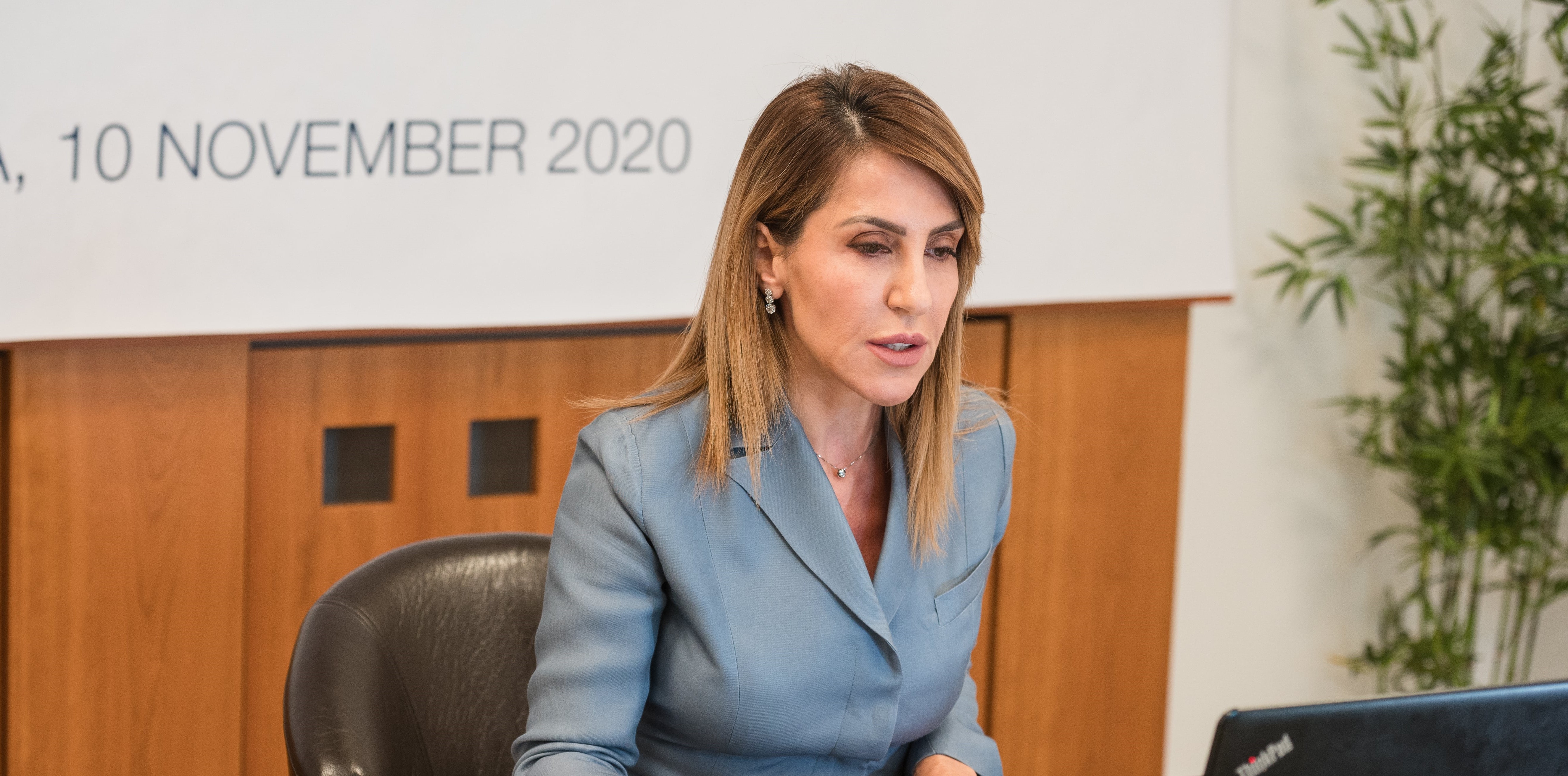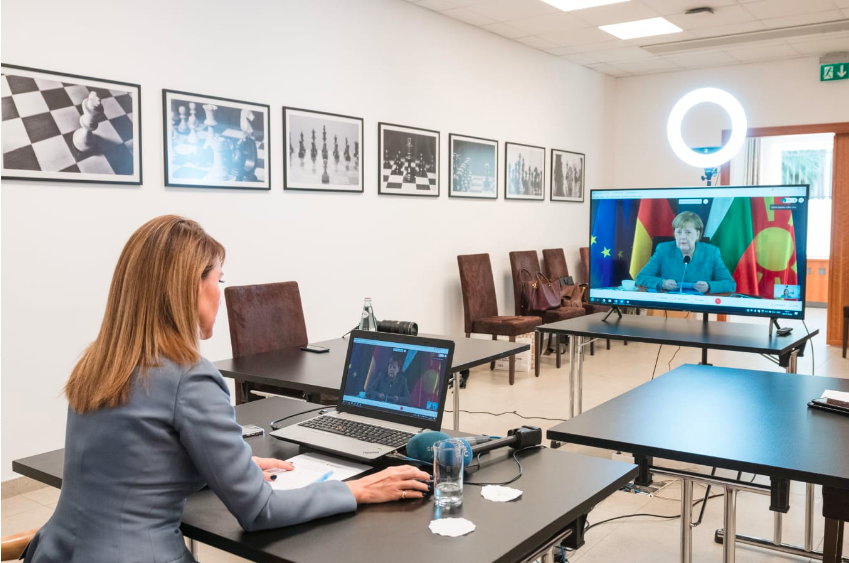A new phase of regional economic integration started today with the Western Balkans Six leaders endorsing the Common Regional Market Action Plan Bregu: Transformation will not happen overnight but setting bold goals will accelerate the change if we can work together
10 November 2020

Majlinda Bregu, RCC Secretary General at Sofia Summit (Photo:RCC/Armand Habazaj)

Majlinda Bregu, Secretary General of the Regional Cooperation Council (RCC) at Sofia Summit, on 10 November 2020 (Photo: RCC/Armand Habazaj)
Sofia - A new phase of regional economic integration started today with the Western Balkans Six leaders endorsing the Common Regional Market Action Plan, and the Green Agenda for the Western Balkans, both facilitated by the Regional Cooperation Council (RCC), at the Berlin Process Summit held online in Sofia today.
MORE INFO ON COMMON REGIONAL MARKET
“The Regional Economic Area Action Plan, born and endorsed in Trieste a bit more than 3 years ago, helped citizens and business community leverage the necessity of regional cooperation even more - 77% believe in cooperation; it helped politicians perceive that transformation of our region, though being difficult, means only one thing: the need for a lot of good will, dedication, readiness for compromise, mutual respect and a shared distaste for conflict. We know the Common Regional Market Action Plan is not going to transform the region overnight or to the rhythm of our prayers. But setting bold goals can help and it will accelerate the change if we can work together. That transformation will have no victims, only beneficiaries,” said Majlinda Bregu, RCC Secretary General, in her address at the official beginning of the Sofia Summit, together with Angela Merkel, German Chancellor and Ursula Von der Leyen, President of the European Commission.
“On behalf of the RCC I am honoured to have had our share of work in shaping this document together with EU NEAR, regional organizations, IFIs, CSO and business community, and other partners. But, WB6 governments are the authors, holders and doers of making the Common Regional Market a reality. Developing this Plan was not a comfortable journey, but it is justified because destination is worthwhile. I wish to thank everybody who entrusted us with this work. I am confident that the Hall of Otherness that separates the region will soon be Togetherness that enriches us.”
“We are thankful that the EU swiftly supported the WB during the first months of pandemic and later adopted the Economic and Investment Plan to spur the economic recovery of the region. Now we know so much more about the necessity to help our business community survive than a year ago. We face the problems and concerns of young people, who get a degree but can’t find a job and we want to give them a chance to work anywhere in the region, without visa constraints. Our commercial and trade relations in the region cannot run anymore on business as usual basis. We have to have a common market, individuals and business to move freely, borders to be kept open for the flow of goods and medicines 24/7, we need digital services to serve people, and we need upskilling and innovations to run. We need diplomas and professions to be duly recognized. And that is why I believe in Common Regional Market. I am confident that this Action Plan born under the Germany Presidency of the Council of the EU will have its first results to show in the coming Berlin Process that will be chaired by Germany,” concluded Bregu.
The Common Regional Market Action Plan facilitates free movement in the region, enables business community to experience the potential provided by a common market based on EU single market model, and highlights the necessity of upskilling the working age population which is shrinking in the region. More info
Besides aligning with the EU Single Market, the region reached another important milestone with endorsing the Leaders’ Declaration on the Green Agenda that aligns with EU Green Deal. Climate change is unfolding slower than the pandemic, but is constantly ruining lives in this region. We hope this Declaration will support and accelerate changes and processes in the region with the overarching goal of addressing climate change.
Conclusions of the Ministerial meeting on Roma Integration are also annexed to the chairs’ conclusions of the Summit. The Ministers of the Western Balkans agreed to strengthen the ongoing work on Roma integration in general, and more specifically in the area of housing, civil registration, data collection, and budgeting. More info
Sofia Summit Chairs' Conclusions
Full speech by the Secretary General Majlinda Bregu
****
Sofia Summit 2020 is held within the Berlin Process initiative dated back to 2014, aimed at boosting regional cooperation in the Western Balkans. This year it is organized under joint Bulgarian and North Macedonian presidency. The Summit gathered region’s and European decision- and opinion-makers, agreeing on the common approach to socio-economic development of the region. The 2019 Western Balkans Summit was held in Poznan under the Polish Presidency. The Summits traditionally also host Civil Society, Business and Youth Forums, although, due to the COVID 19 pandemic, this year’s format was significantly changed and held as an online event.
The Common Regional Market continues on the results of the Multiannual Action Plan for the Regional Economic Area (MAP REA) that was endorsed in Trieste 3 years ago, when the WB6 leaders agreed to give a chance to this region to build its own economic area by enabling unobstructed flow of goods, services capital and highly skilled labour, making the region attractive and fit for investment. REA paved the way through a mixed track record of success stories. Now we pay up to 96% less roaming charges in the entire Western Balkans, and from July 2021 it will be 0. Trade in goods increased by 25% while FDI saw an increase of 35% since 2016. More info.



